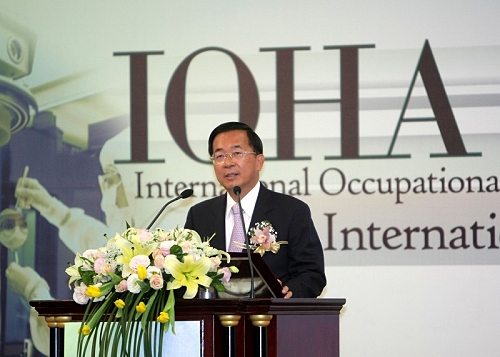News & activities
 News releases
News releases
Remarks at the 7th International Scientific Conference of the International Occupational Hygiene Association
Chen Shui-bian
President
Republic of China (Taiwan)
February 18, 2008
Conference Co-chair President Tsai, Conference Co-chair Professor Chen, President Grumbles of the International Occupational Hygiene Association (IOHA), Former IOHA President Ferrie, Esteemed Colleagues, Distinguished Guests, Ladies and Gentlemen:
Good morning to you all!
It is a great pleasure for me to have been invited to address the 7th International Scientific Conference of the International Occupational Hygiene Association being held here at the Taipei International Convention Center. On the occasion of this important conference, I would like to welcome local representatives from government, industry, and academia and, on behalf of the government and the 23 million of Taiwan, extend my most heartfelt welcome to attending occupational hygienists from abroad.
In the past two decades, hazards in the workplace have multiplied because of rapid technological advancement. All more advanced nations have studied the problems and passed occupational health and safety legislation to ensure health and safety in the workplace.
In Taiwan, industrial development and economic growth during the 1960s and beyond led to a sharp rise in worker casualties. Major industrial accidents were frequently reported in those days, including, for example, the Juisang coalmine explosion in 1969, the Fego Electronics Company organic solvent poisoning case in 1972, and the Taiwan International Shipbuilding Corporation acetylene explosion incident. These tragedies galvanized the government into passing a law to safeguard worker health and safety.
Taiwan became the first country in Asia to have a worker health and safety law when the Labor Safety and Health Law was passed in 1974. Moreover, with the establishment of the Council of Labor Affairs under the Executive Yuan in 1987, the government has been able to commit significantly more personnel and resources to occupational hygiene and safety. Meanwhile, occupational hygiene and occupational medicine courses offered by universities and graduate schools have helped train more professionals in these fields.
In 1992, the Council of Labor Affairs established the Institute of Occupational Safety and Health to improve cooperation between the government and research organizations dealing with workplace health and safety. Taiwan's workforce is over 10 million strong and includes over 40,000 occupational hygienists. Government measures have been implemented with combined budgets of over NT$10 billion aimed at preventing and reducing hazards in the workplace. These efforts clearly demonstrate our commitment to worker safety. In addition, the Occupational Accident Labor Protection Law, promulgated in 2001 and in effect since April 28, 2002, not only testifies to the significant attention the government pays to occupational hygiene and safety but has also helped realize labor protection policies.
The International Occupational Hygiene Association is a non-governmental organization dedicated to improving and promoting occupational hygiene around the world. Established in 1987, IOHA now has 25 member organizations and over 20,000 members, all professional occupational hygienists. So far, IOHA has held six international conferences in Australia, Norway, South Africa, and three other countries.
In Taiwan, high-tech industries, such as the semiconductor, nanotechnology, biotechnology, and solar energy industries, are replacing traditional ones. In order to learn the latest information on occupational hygiene relevant to this shift and enhance exchanges in health and safety, the Taiwan Occupational Hygiene Association (TOHA) bid to host the IOHA's International Scientific Conference. We feel very proud as well as honored that the TOHA's hard work in 2005 paid off and it won its bid to host this year's conference.
This year's conference has the highest number of participants in the history of IOHA conferences. The number of submitted papers, 229, is also higher than ever before. Participating this year are occupational health and safety experts and industry representatives, including those from China Steel Corporation and CPC Corporation, Taiwan, and companies of major science parks, as well as over 500 occupational hygienists from 38 foreign countries. The host has planned a wonderful tour of Taiwan's landscape, culture, and people, so that participants may get to know the beauty of this island nation. I am confident that the tour will leave those who take part with fond memories of Taiwan.
I deeply appreciate your attendance at this conference. I am sure the exchanges that will take place here will help enhance standards of occupational safety and health in Taiwan and also allow attendees from abroad to learn about our country's efforts to safeguard health and safety in the workplace. Please do not hesitate to share your thoughts and ideas freely with our agencies and help Taiwan improve in occupational hygiene and safety.
In closing, I would like to wish this conference every success and all distinguished guests health and happiness. Thank you.



